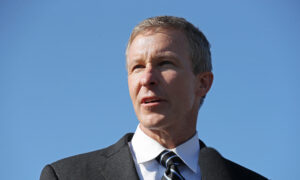
United Airlines CEO Scott Kirby issued a formal apology on Friday after facing criticism for chartering a private jet during the height of nationwide travel disruptions caused by adverse weather conditions.
Kirby expressed regret for his decision to take a private jet from Teterboro Airport in New Jersey to Denver, Colorado, on Wednesday, acknowledging it was the “wrong decision because it was insensitive to our customers who were waiting to get home.”
“I sincerely apologize to our customers and our team members who have been working around the clock for several days—often through severe weather—to take care of our customers,” Kirby said in a statement to The Epoch Times via email.
“Watching our team firsthand with our customers at four different airports and during countless meetings this week, it’s clear to me they represent the best of United, and I regret that I have distracted from their professionalism,” he said.
The airline boss promised to “better demonstrate my respect for the dedication of our team members and the loyalty of our customers.”
Kirby’s apology follows his recent criticism of the Federal Aviation Administration’s (FAA) handling of flight cancellations and delays due to severe weather. Thunderstorms and equipment failures at an FAA facility resulted in significant disruptions, temporarily halting incoming flights in Washington and New York.
In a memo addressed to United Airlines employees on Monday, Kirby attributed the challenges faced by the airline to a shortage of FAA air traffic controllers, referring to the situation as “unprecedented.”
“We estimate that over 150,000 customers on United alone were impacted this weekend because of FAA staffing issues and their ability to manage traffic,” Kirby wrote.
Citing specific instances of reduced arrival and departure rates at Newark Liberty International Airport, Kirby pointed out that understaffing and lower experience levels at the FAA “almost certainly” contributed to the extensive delays and cancellations.
That “put everyone behind the eight ball when weather actually did hit on Sunday and was further compounded by FAA staffing shortages Sunday evening,” he said.
Kirby emphasized the urgency to resolve this problem and expressed his intention to meet with the FAA and Department of Transportation to discuss immediate measures to prevent a recurrence during the summer season.
While acknowledging that the current FAA leadership did not create the staffing issue, Kirby emphasized that “they are responsible for solving the problem they inherited.”
On Tuesday, the FAA responded by affirming its commitment to “collaborate with anyone seriously willing to join us to solve a problem.”
Travel Disruptions
Over the weekend, a series of powerful storms swept across various parts of the country, including the Mid-Atlantic and the Northeast, where major air hubs are located. As a result, more than 32,000 flights were delayed on Monday, followed by over 28,000 delays and 2,800 cancellations on Tuesday.
The FAA has acknowledged its understaffing concerns at critical facilities, particularly in the New York City region. While the agency is training approximately 3,000 new air traffic controllers, the process will not yield immediate results. In the meantime, the FAA has advised airlines to reduce flights in the New York City area and has opened 169 new flight paths along the East Coast to alleviate congestion.
A recent report from the Transportation Department’s inspector general revealed that the FAA’s efforts to adequately staff vital air traffic control centers have been limited, lacking a comprehensive plan to address the problem.
In a separate development, Transportation Secretary Pete Buttigieg warned airlines that aircraft without new radio altimeters, which measure the plane’s height above the ground, will not be permitted to operate in limited visibility conditions due to potential interference from 5G wireless service.
While major carriers, including American, United, Southwest, Alaska, and Frontier, have retrofitted their planes accordingly, Delta Air Lines still has approximately 190 aircraft awaiting updates due to supply constraints. Delta has assured that it will strategically schedule these planes to avoid adverse weather conditions and minimize disruptions.
However, smaller regional airlines and international carriers operating flights to the United States may also be affected by this requirement.
Jane Nguyen and The Associated Press contributed to this report.

















































